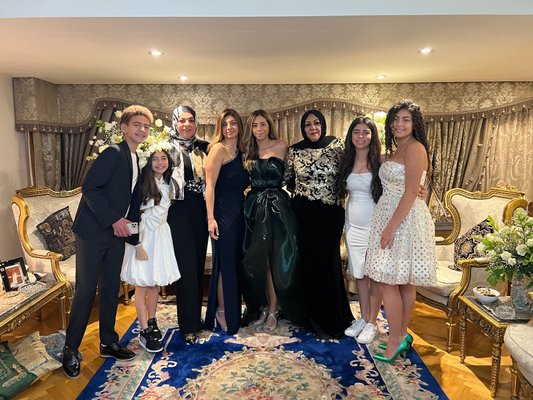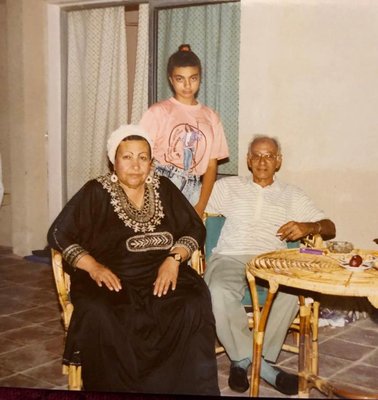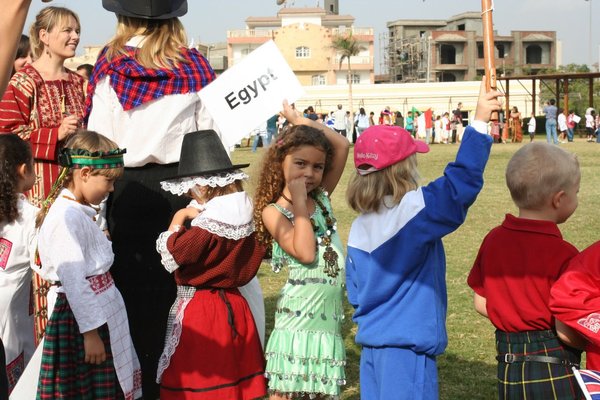My Journey of Self-Worth as an Egyptian WOC
Jia WeedonI am sitting amidst a pile of photos and postcards. The city of Cairo roars outside the window, accompanied by the sound of my grandparents’ footsteps, circling the apartment foyer. I see spectacles of dust all around me, the suitcase of memories having been kept shut for years.
Stories of my mother, grandmother, and great-grandmothers engulf me. I am mesmerized by their updos, hijabs, and mini-skirts: my great grandmother in her black and gold jalabeya, my grandmother with her bob-cut jet-black hair and 70’s red pencil skirt, my mother with a diamond-clad tiara sitting atop a head of pinned curls.
Each stares at the camera. Their eyes are unapologetic. They look fierce, joyful, and resilient. I think to myself; they look beautiful.

And yet, driving around Cairo that very same day, I see billboards advertising blonde straight hair. Not the hair of my family nor my ancestors and not the hair of most Egyptians. The hair of our colonizers.
Hair becomes my first and only axis for accessing beauty. But, unlike the scores of Egyptians who run to the salon every weekend to flatiron their manes of curls, I love curls. I look at mine in the mirror on Friday mornings, admiring the spirals and cascades of color that make up my voluminous head. I’ve been told my hair makes me look like a lion, and I take it as a compliment.
Gradually, billboards, TV shows, Disney movies, and celebrities expand my conception of beauty, narrowing down who I am inclined to see as beautiful–and why.
This romanticized definition of beauty begins to include colorist ideals of skin tone, racist understandings of ethnic hierarchies, and fatphobic perceptions of weight and figure. The bottom line is: that we, Egyptians, are not naturally beautiful.
The Eurocentric beauty standards ripple throughout my friend group. One girl develops life-threatening anorexia, while another flies to Lebanon for plastic surgery. We are 11, maybe 12, too young to know any different from these toxic standards. We inherit these conceptions of beauty, and slowly, we no longer believe we–Egyptian girls–are beautiful. We do not believe we are worthy. And we do not understand the harm we are perpetuating–to ourselves and to each other.
I panic, torn between patching up my friend group and taking care of my own emotions. I, too, feel unworthy. But I refuse to let my friends catch on. I refuse to give into the plague, refuse to let beauty standards cut us up into shards of human beings, reducing each and every one of us to a characteristic and not a person.
I refuse to feel less than.
So I flip through photos of past generations of Southwest Asian and North African (SWANA) women often. I learn about bedouin Burgus, imagining myself wearing one, the gold coins lining the dark fabric making noise as I walk, the cloth covering my body making me feel powerful, strong, and defiant.

I learn a lot about SWANA dress during this period of my life. And it is the only reason I find beauty in myself and my people. I see Moroccan kaftans, Palestinian tatreez, and Egyptian galabeyas. And in the colorful traditional wear of my ancestors, I find hope, resistance, and self-worth.
When my family and I then move to the US, I am 13. My mother takes me to get my eyebrows threaded and the woman at the salon firmly looks at me before starting, warning, “beauty is pain, honey.”
Those words stick with me, toxically lace every conversation I have with friends about beauty thereafter.
I know now, thanks to the radical care of my community, that beauty is not pain. Beauty is joy, love, warmth, and culture. It is the resilience of our immigrant mothers and the strength of our conflict-afflicted countries. It is the loud Ramadan iftars I hold deep within my heart and the quiet reflective wisdom I glean learning to bake with my Egyptian teta. Beauty is the way that my Arab nose hangs, full, piggy-like, arched. The way my eyebrows pierce my face, the dark hair a stark contrast to my olive brown skin. Beauty is in the creases 19-year-old me already has around her eyes, developed from equal years of laughter and concern, bliss and worry.
Beauty is all that–and so much more. It is whatever you want it to be, whatever fuzziness you draw from your heritage, whatever qualities you find within yourself.

But that sense of self-worth, that realization that you are beautiful not because of what your hair looks like or in spite of it, but because of who you are and where you come from, that is beautiful. And it makes you ten times more likely to see yourself as beautiful.
I still get urges to bury myself in the endless spirals of curls resting on my head and sob, ask myself or Allah why I look a certain way and beg for Him to change me, the way I look. I may always get those urges, residue of years of eurocentricity and colonialism baked into me and my perceptions of beauty.
But in those moments, I force myself to remember my self-worth. To picture the Tunisian djellabas and Turkish yarmaks of the region of the world I call home, to search for beauty and care in the people I know and the communities I love.
You are beautiful, without pain, straight hair, or plucked eyebrows. You are and always will be beautiful, sitting amidst a pile of pictures and postcards, face covered in dust, heart full, taking care of yourself and loving who you are.
--

Anise Health is the first culturally-responsive digital mental health platform offering therapy, coaching, and digital self-service tools that are tailored for the unique needs of communities of color. Our interventions move away from diagnosis-driven, Eurocentric models and towards incorporating culture and intersectionality into evidence-based treatments, which research shows to be 5x more effective.
Interested?
Anise is live in California and is currently accepting Asian-identifying adults (ages 18+) and partners/family members as new clients. Get started by filling out our short intake form; you will be matched to culturally-responsive clinicians within 2 business days. If you identify with another community of color or reside in another state, sign up for the distribution list on our website to be the first to know about upcoming launches!
